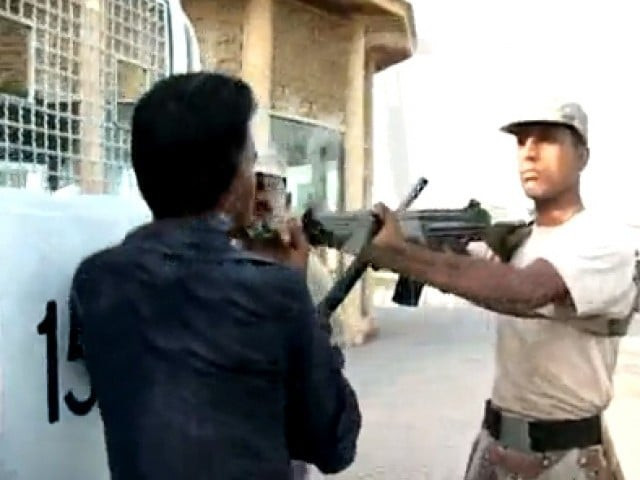By upholding judgment in Sarfaraz Shah’s case, court sets precedence for others
Lawyers agree that compromise cannot be reached on a crime against society.

Screenshot from video which captured the murder of Sarfraz Shah in 2011. PHOTO: EXPRESS
The 42-page judgment announced by the anti-terrorism appellate bench of the SHC in the famous Sarfaraz Shah’s murder case rejected the appeals of the convicted, upholding the earlier punishment announced by the court. Shah was shot by the Rangers personnel in the Shaheed Benazir Bhutto Park in Clifton on June 8, 2011.
The Anti-Terrorism Court sentenced the Rangers personnel, Shahid Zafar, to death on August 12, 2011 while others were sentenced to life imprisonment. The victim’s family had, however, pardoned the convicts on May 15, 2013. But it did not help the convicts on Tuesday in the court of law as the judges dismissed the appeals, noting, “The manner in which the brutal murder of the deceased was committed, caused sensation in society. Such offence was against the society and it cannot be permitted to be compounded by an individual/legal heir of the deceased on any score whatsoever.”

Sindh High Court Bar Association President ZK Jatoi said that although the offence of murder is compoundable in the law, the apex court has recently highlighted that an offence committed against the society is not compoundable.
“In my opinion, this is right,” said Jatoi, which has already filed a petition in the high court seeking hanging of the prisoners on death row to curb the escalating violence in society. “I fully support it but it should not be misused.”
Karachi Bar Association President Barrister Sallahuddin Ahmed was also in agreement, clarifying that no one in society enjoys impunity. “Anyone who indulges in a criminal act is liable to be tried under the law, no matter if he/she belongs to a law-enforcement agency.”
A senior criminal lawyer, Farooq Ahmed, however, was of the opinion that the nature of the act must be differentiated. “Actions of the law enforcement agencies’ personnel cannot be treated as an act of terrorism given the act was done in the line of duty. If they’re involved in a criminal act in personal capacity then it can be tried and prosecuted,” he said.
Compromised
The SHC’s judgment could have sealed the fate of ‘compromise deals’ reached between the litigants in at least two other cases — the alleged murder of a taxi driver, Mureed alias Murad, by the Rangers personnel and the murder of Shahzeb Khan.
Mureed was shot dead by Rangers’ personnel, allegedly for not stopping his vehicle, in Gulistan-e-Jauhar on July 16, 2013.
During the course of the trial, the deceased’s family reached a compromise with the paramilitary force, against one job and blood money amounting to Rs2 million. The verdict has yet to be announced.
In the high-profile murder case of Shahzeb Khan, the family pardoned the convicts after they were awarded death sentence and life imprisonment.
Legal observers believe that the matter could not be compromised as the act of the killers had sent a wave of terror in the society, making the offence not against the individual but against the society at large. On this point, the trial court had convicted and sentenced the four accused under section 7(a) of the Anti-Terrorism Act 1997.
“The higher judiciary has struggled to highlight that such offence falls within the ambit of fasad-fil-arz or committing mischief on earth. And the judgment in Sarfaraz Shah murder case would be considered as a precedence for other cases like the Shahzeb Khan murder case, in future,” said Jatoi.
Published in The Express Tribune, January 22nd, 2014.



















COMMENTS
Comments are moderated and generally will be posted if they are on-topic and not abusive.
For more information, please see our Comments FAQ